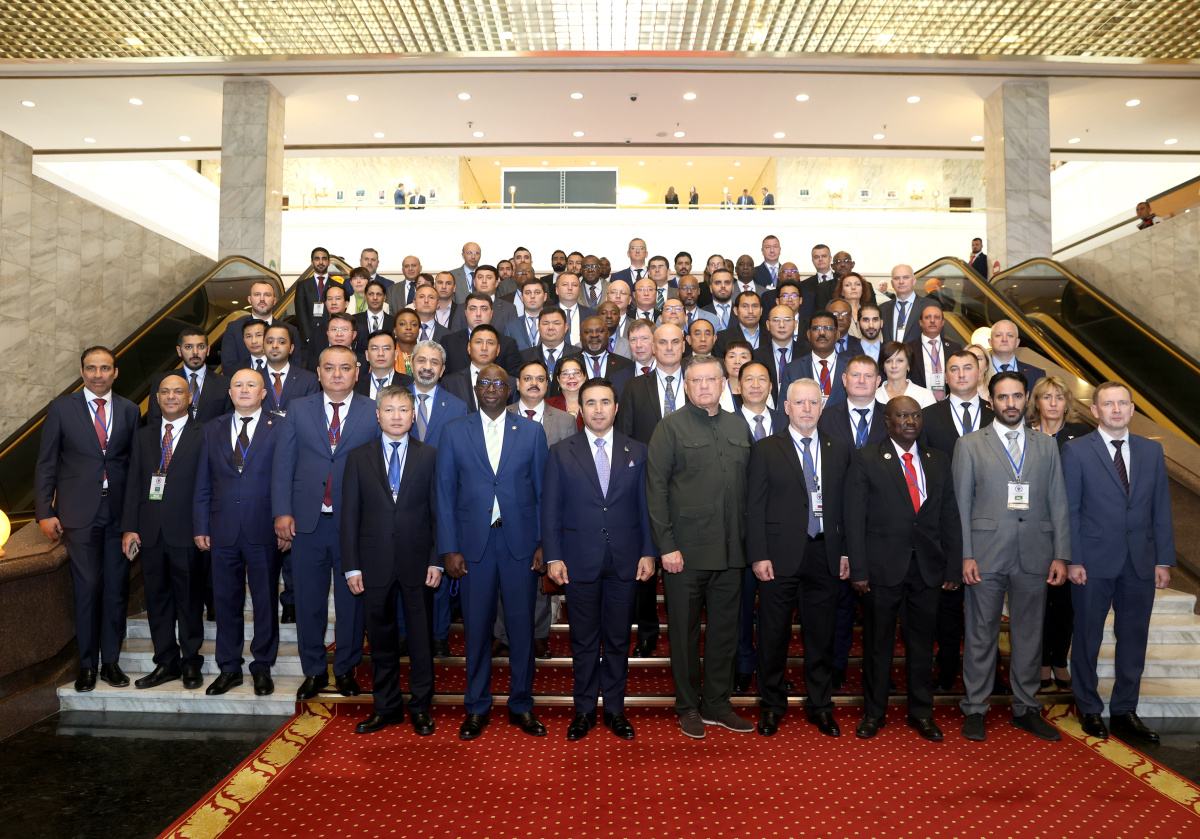On July 4, 2025, a delegation of the CSTO Secretariat visited the Central Military-Patriotic Park of Culture and Recreation of the Armed Forces of the Russian Federation "Patriot".
The Kyrgyz President Sadyr Japarov received the Ministers of Foreign Affairs of the CSTO member states and the Secretary General of the Organization in Cholpon-Ata on June 30. The meeting was attended by the Foreign Ministers of Kyrgyzstan, Belarus, Kazakhstan, Russia and Tajikistan.
On June 30, 2025, a regular meeting of the CSTO Council of Foreign Ministers was held in Cholpon-Ata (the Kyrgyz Republic) under the chairmanship of the Kyrgyz side, which was attended by the Organization's Secretary General Imangali Tasmagambetov.
Safar Umarzoda, Head of the Department for Countering Challenges and Threats of the CSTO Secretariat, took part in a special event (side-event) on "Countering Radicalization leading to terrorism and Extremism" organized by the Russian Federation on the margins of the OSCE Annual Conference on Security Review, where he reported on the measures taken by the CSTO on countering terrorism and extremism, and willingness to share the experience gained.
International Conference on the Spread of Extremist Ideology
 26.09.2024
26.09.2024
On 25-26 September 2024, the IV International Conference on the Spread of Extremist Ideology, organized by the Ministry of Internal Affairs of the Russian Federation, was held in Moscow.
The conference was attended by representatives of more than 40 countries from different regions of the world. The forum participants included representatives of the Collective Security Treaty Organization, the Shanghai Cooperation Organization, Interpol, the anti-terrorist center of the CIS member states, the Bureau for Coordination of the Fight against Organized Crime and Other Dangerous Types of Crime on the Territory of the CIS member states, experts from the Russian Ministry of Foreign Affairs, the Russian Ministry of Defense, Roskomnadzor, and the National Anti-Terrorist Committee of the Russian Federation.
The conference participants have discussed topical issues of countering extremist manifestations around the world, exchanged experience in combating this evil, and developed joint measures to improve the effectiveness of international cooperation in this area.
According to the conference participants, in preserving the rule of law and ensuring the stability of each state, the primary role remains with the relevant state structures, which should rely in their work on civil society institutions, including good non-profit and religious organizations of the relevant profile.
CONFERENCE RESULTS
The participants of the Fourth International Conference on the Spread of Extremist Ideology in the course of their speeches:
WERE UNITED in the need to preserve peace and stability, to develop relations between countries on the basis of equality, good neighborliness, humanism and justice, to create an environment of intolerance to attempts to destroy traditional social interethnic, interreligious, economic and other ties.
EXPRESSED concern about the growing spread in various regions of the world of such dangerous types of extremism as radical beliefs, racial discrimination, xenophobia and Nazi ideology, which, against the background of the general aggravation of the international situation, especially the expansion of the zones and geography of armed conflicts, inter-religious and inter-ethnic clashes, can lead to catastrophic consequences.
CONSTATED the facts of mass application by extremists of modern information and communication technologies and social engineering methods to introduce their ideas into the mass consciousness of people, the seizure (transfer) by terrorists and criminals of advanced military equipment and means of communication, and their tacit or even open involvement by individual states in the solution of their special and military tasks.
NOTED the inadmissibility of distorting human history, especially in terms of justifying Nazism and falsifying the outcome of the Second World War.
RECOGNIZED the existence in the world of regions where armed conflicts and confrontations have been going on for years, including those provoked from outside in order to preserve the military, ideological and economic influence of a number of states and military-political blocs, as dangerous for world stability.
EMPHASIZED the unacceptability of the revival of the Nazi ideology and the glorification of its followers.
CONSIDERED that countering such threats and challenges requires the consolidated efforts of all states and civil society institutions, the preservation of the importance and role of international law, the rejection of “double standards” and the active participation of specialized international organizations that bring together law enforcement agencies and civil society institutions from different countries.
RECOGNIZED the importance of urgently adopting comprehensive international measures to address the causes and conditions conducive to the emergence and spread of extremism, including through concerted information campaigns exposing specific apologists and sponsors of extremism, their subversive aims and methods of activity, to provide the necessary legal, human, material and technical basis for this work, including through the establishment of specialized international organizations and NGOs.
EXPECTED to expand cooperation in countering multi-component extremist cyber threats and to increase the intensity and quality of the exchange of operationally relevant information.
GAVE SPECIAL IMPORTANCE to coordinating the positions of law enforcement, other state bodies, public and religious organizations of the countries interested in preserving the world order and protecting traditional values.
SHARED the positive experience of the participating countries in preventing and combating the spread of extremist ideology, especially among young people.










